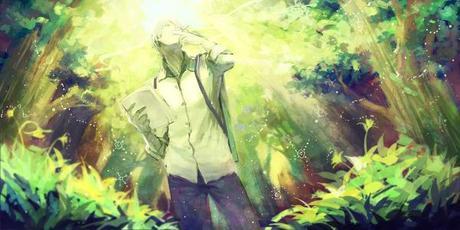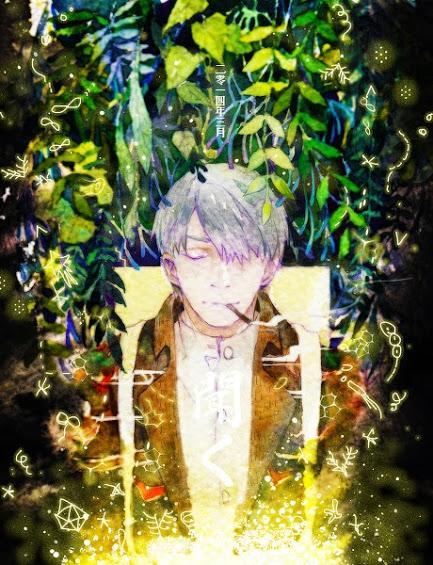This is a guest post by Ayame from the beautiful world.
 The year that passed, Hiroshi Nagahama and Artland blessed us with a second series and a film of Mushishi (Funimation, Crunchyroll). Mushishi is a series that is seen by many as state of art – or if we want to talk more humbly as an exceptionally well-crafted, intensely atmospheric story. It is a serene and, at times, horrifying reflection on the human psyche and its relation to its natural and social environment; thus it has charmed a lot of viewers. Yet there are people who aren’t really fond of it. From those there’s a good portion who find its slow pacing sleep-inducing – which is understandable, but there are also a few that dislike it for how its world and protagonist are presented. Mushishi is namely accused of being fatalistic, but is it really?
The year that passed, Hiroshi Nagahama and Artland blessed us with a second series and a film of Mushishi (Funimation, Crunchyroll). Mushishi is a series that is seen by many as state of art – or if we want to talk more humbly as an exceptionally well-crafted, intensely atmospheric story. It is a serene and, at times, horrifying reflection on the human psyche and its relation to its natural and social environment; thus it has charmed a lot of viewers. Yet there are people who aren’t really fond of it. From those there’s a good portion who find its slow pacing sleep-inducing – which is understandable, but there are also a few that dislike it for how its world and protagonist are presented. Mushishi is namely accused of being fatalistic, but is it really?
The answer, in my opinion, is no.
~.~.~
Draggle, a fellow blogger and sometimes a loveable troll, stated:
Mushishi sucks. It's a show for people who like to sit around and watch the world burn down around them. I prefer to set it on fire.
— Stargeant Draggle (@draggle_kun) April 5, 2014
Mushishi indeed appears to focus on stories where people are acted upon: a person or some people are infected by mushi, suffer as a result and they need treatment. The way the series itself structures the episodes, usually starting with the “therapy case” and delaying the protagonist’s appearance, does give the impression of a narrative spinning around passivity.
This is a very flat interpretation though. Mushishi may be a human drama above all else, but this doesn’t equal an acceptance of fate or wallowing in tragedy for the sake of pessimism. Ginko interferes after all and most of the time saves the day. Some people turn to him to solve their problems – they act, they ask him for advice having their own good in mind. There are even cases where people sought mushi and utilized their power for their own purposes, like the sea villagers who took advantage of Uminaoshi to create clones of themselves, extending their lives in some sense (ep.22, s1) or Ibuki using the Torikaze to blow wind to the sails (ep.8, s2).
~.~.~
Frog-kun, who, despite enjoying the series, seems troubled over something that appears as a plot hole and implies a passive acceptance of how the world works:
@FoxyLadyAyame @draggle_kun One thing I always wondered was why don't the Mushishi attempt to educate everyone about the mushi so that-
— Shipping?Frog-kun (@frog_kun) April 7, 2014
@FoxyLadyAyame @draggle_kun – they would KNOW how to coexist with mushi better. But that's never brought up at all.
— Shipping?Frog-kun (@frog_kun) April 7, 2014
There are many possible reasons for this omission. Firstly, the invisibility of mushi makes this job hard. In Mushishi Hihamukage we see the people doubting Ginko’s words and indications, probably considering him a madman or con artist. A man asked if the root Ginko instructed them to search really existed, while an old woman asked our mushishi how he was expecting them to believe him when he was vague himself and their search bore no fruits. They were only focused on their problem, i.e. absence of the sunlight, and the explanations given without tangible proof appeared as empty theories.
Secondly, judging from the endless landscapes we see in the series, the story must be taking place in a pre-industrialized Japan. It’s pretty safe to assume that there is no organized education. We know mushishi can read because they have to look for solutions in archives, but if common people get any education at all, it’s perhaps very basic. Under such conditions education of the wider masses concerning mushi might not be viable or at least very hard to achieve.
Thirdly, we shouldn’t forget that the experts who can act as teachers have their own problems and motivations. Ginko, for example, can’t stay long enough in a place because he attracts mushi, and a big population of mushi in an area is bad news for the local ecosystem. Not everyone is like Ginko, but we can guess that a good part of mushishi bear similar abilities – Mujika (ep.11, s1) and Nui (ep.12, s1) do. Additionally, there’s need to tend to miscellaneous problems in many different places and that’s what encourages them to be wanderers. We rarely ever see a mushishi being a permanent resident of a village, like Yahagi (ep.24, s1). Then, we also have to consider the practicality of a single person studying and researching a vast field much like doctors nowadays.
If we are willing to use negative lenses, lust for power could be another reason since knowledge is power and a clique of knowledge bearers wants to retain the status quo. Moreover, most Mushishi don’t care about balance –or to be correct they don’t care at all about the mushi as living organisms worth the same respect as others. They are like Ghostbusters or Pest Exterminator Services. So naturally, they wouldn’t give a thought to educating people about mushi. Tanyuu, the scriber, who writes down such stories to battle an old dangerous mushi sealed in her body (ep.20, s1), was really sick of listening to mushishi only killing mushi, until Ginko came in her life.

One last complaint I hear often towards Mushishi is that Ginko is know-it-all and a poker face. Draggle says:
@JackieCae haha it's okay. I think the reason I don't like Mushishi is because the main guy is so detached from everything. makes me mad
— Stargeant Draggle (@draggle_kun) December 27, 2013
Ginko is a scientist: he methodically observes and dives into every archive he can find to search for information and cures; he uses a microscope and a scalpel. Ginko is wise indeed but he wasn’t like that always. In this second season (ep.11) we see a young Ginko committing a grave mistake out of loneliness and jealousy and as a result he’s kicked out by his teacher. We see him underestimating a situation once in awhile, not being able to reach the right conclusion in time or being on “scouting missions” where he heard a new mushi type appeared, as well.
He’s generally stern but accusing him as detached is simply false. When he’s not called to heal an ailment, he pokes his nose where he believes is needed either because humans are at serious danger or nature is being abused. This means he does care. One such case is when Isana (ep.22, s1) embarks into the tumultuous sea all alone at first and after they reach the shore safely together, he reprimands her for her thoughtlessness and how she “scared him to death”. But even earlier in the series (ep.5, s1), Ginko agonizes over saving the swamp girl and is obviously upset when he thinks he failed to do so. Likewise, he’s agitated and at loss when Yuuta-kun disappears (ep.17, s2). He’s bewildered and angry at the hideous crimes committed by the doctor’s family to preserve Saho and we see him playful and smiling when around Adashino and Tanyuu. Ginko certainly isn’t emotionless.
~.~.~
Mushishi can lead you to unexplored emotional places of your being if you have the patience to let it to. It might not be action-packed, but it has warmth and craft. This is a series that has passed the test of time to re-emerge victorious for a sequel 8 whole years after its first appearance. Any doubts won’t hold much; just open your eyes and ears and enjoy.
Foxy Lady Ayame is tad obsessed with animation and comics from around the world, opening up to games, generally enjoying elaborate artworks, and interested in gender & sex. Often getting lost in the internet. Partner in life traveling with Neko-chi over at kitsunetoneko.wordpress.com.

